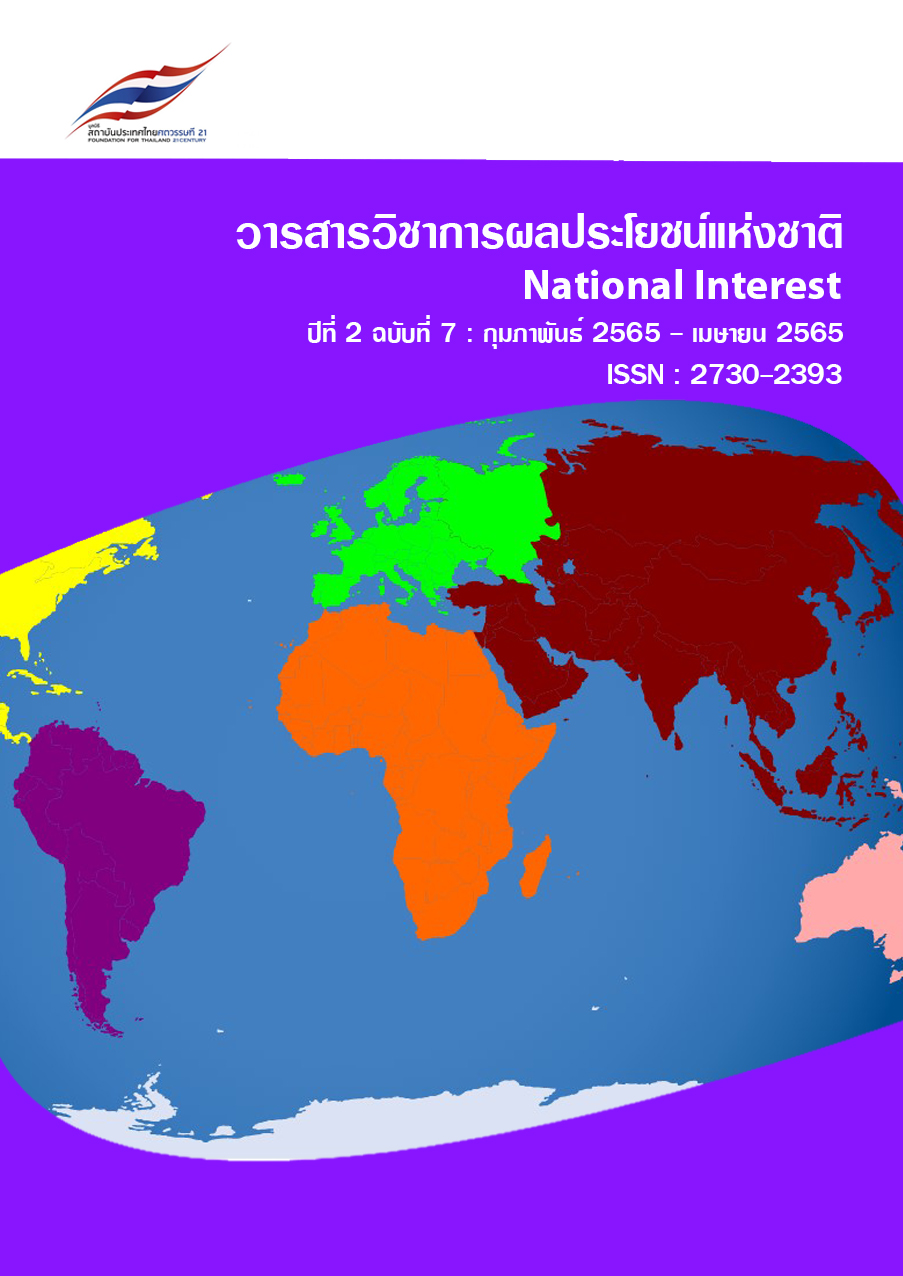Quality management of the education in higher education institutions of Ukraine on the principles of business socially responsibility
Main Article Content
Abstract
The article systematizes the elements that determine the quality of higher education according to ISO, EFQM, MBNQA, SQAF, ABEF, TQM. The main approaches to the formation of quality education in Ukraine are outlined. Peculiarities of providing quality education in Ukraine are determined. It is noted that the quality of education affects the country's competitiveness and its place in world rankings.
Article Details

This work is licensed under a Creative Commons Attribution-NonCommercial-NoDerivatives 4.0 International License.
National Interest Academic Journal under Creative Commons Attribution-NonCommercial-NoDerivatives 4.0 International License The journal allows access or distribution of academic work without charge or registration. To support the exchange of knowledge Scope covers academic work in geopolitics. Geoeconomics and Innovation
Users can share, copy and distribute all information published in National Interest Academic Journal in any form or medium subject to the following conditions:
Citation — Permission to use, reproduce, distribute, or modify the work. But credit must be given to the owner of the work. If the work is used without credit, the name of the owner of the work will be Must obtain permission from the owner of the work first.
Noncommercial — The work may be used, reproduced, distributed, or modified. However, the work or article may not be used for commercial purposes.
Cannot be modified — The work may be used, reproduced, and distributed. But do not modify the work. unless permission is received from the owner of the work first
References
N. Avshenyuk, Quality higher education is an instrument of social and cultural harmony and
economic growth. [Online]. Available: https://bit.ly/3J8FWGB [Accessed August 30, 2021].
A. Vasilyuk, M. Day, V. Bazelyuk. Kyiv; Nizhyn, “The quality of higher education: theory and
practice: a textbook” Kyiv: Publisher PE Lysenko M.M., 2019. 176 p.
G.M. Alekhina, “Quality of education in the context of modern transformations of higher
education”[Online].Available:https://www.researchgate.net/publication/336406700_Akist_osviti_u_konteksti_sucasnih_transformacij_visoi_osviti [Accessed August 30, 2021].
IAMAI, “Nielsen India internet 2019”. [Online]. Available: https://cms.iamai.in/Content/ResearchPapers/d3654bcc-002f-4fc7-ab39- e1fbeb00005d.pdf [Accessed August 30, 2021].
V. Thirumurthy and N. Sundaram, “Computers for young children in India,” Childhood Education, vol.79,no.5, 2003, pp.307-313.
Bharadwaj, V , “ICT usage in 1000 schools in India,”Digital Learning, vol.3,no. 11, 2007, pp. 8-15.
C. Gupta and K. Haridas, “Role of ICT in improving the quality of school education in Bihar (working paper),” 2012, IG Cinternational Growth Centre website [Online]. Available: http://www.theigc.org/wp-content/uploads/2014/09/Das-Gupta-KPN-2012-Working-Paper.pdf [Accessed August 30, 2021].
R. Prasad, “Global ICT standardisation forum for India (GISFI) and 5G Standardization,” Journal of ICT Standardization, vol.,no.2, pp. 123-136,2013
Y.D. Netragaonkar, “Issues in ICT education: barriers, problems and role of teachers in ICT Education,”Scholarly Research Journal for Interdisciplinary Studies, 2013, [Online]. Available:www.researchgate.net/publication/286354229 [Accessed: August 30, 2021].
A. Kundu, T. Bej and K.N. Dey, “Effects of self-efficacy and infrastructure on teachers’ ability
of ICT use,” International Journal of Web-Based Learning and Teaching Technologies, 2021, doi: 10.4018/IJWLTT.
P. Kundu, “Indian education can’t go online – only 8% of homes with young members have computer with net link. Scroll.in,”2020, [Online]. Available: https://scroll.in/article/960939/indian-education-cant-go-online-only-8-of-homes-with-school-children-have-computer-with-net-link [Accessed August 30, 2021].
C.N. Bindu, “Barriers to ICT integration in teaching: a case study of teachers in Kerala,”
,[Online].Available:http://educationindiajournal.org/home_art_avi.php?path=&id=351 #[Accessed August 30, 2021].
S. Ojha, “Restriction on internet in J& K,”2020, [Online]. Available:
www.indialegallive.com/constitutional-law-news/courts-news/restriction-of-internet-in-jk-and-various-petitions-demanding-its-restoration-96869 [Accessed August 30, 2021].
India Today, “Around 27% school students have no access to smartphones, laptops to
attend online classes: NCERT survey,” 2020, [Online]. Available: www.indiatoday.in/education-today/news/story/approximately-27-school-students-do-not-have-access-to-smartphones-laptops-to-attend-online-classes-1713208-2020-08-20 [Accessed August 30, 2021].
D. Matorera, Quality Management Systems in Education, IntechOpen, 2018, DOI: 10.5772/intechopen.71431
A.V. Kaidalova, O.V. Posilkina, “Theoretical and methodological approaches to assessing the quality of higher education in the context of world rankings of higher education institutions,”Pharmaceutical Journal, no 4, 2015, pp. 75–81. DOI 10.11603/2312-0967.2015.4.5562
S. Kvit, “Annual report of the National Agency for Quality Assurance in Higher Education
for 2019”. Kyiv: National Agency for Quality Assurance in Higher Education, 2020. 244 p.
S. Kvita and O. Yeremenko, “Annual Report of the National Agency for Quality Assurance
in Higher Education” K .: National Agency for Quality Assurance in Higher Education, 2021.364 p.
O.Polinkevych, „Porównawcze aspekty polityki innowacyjnej w gospodarce USA i Ukrainy w
światłe transformacji szkolnictwa wyższego,” KELM, vol. 3m,no.19, wrzesień, pp. 166–173,2017
O. Polinkevych, “Development of enterprise in innovation university,”KELM, vol. 3 ,no.23, pp. 137–148,2018,
O. Polinkevych, “Role of the service sector in the innovation development of Poland and Ukraine,” Roczniki Ekonomiczne Kujawsko−Pomorskiej szkoły wyższej w Bydgoszczy, no
, pp. 337-357, 2018,
O. Polinkevych, I. Khovrak, V. Trynchuk, Y. Klapkiv and I., “Volynets Business Risk
Management in Times of Crises and Pandemics,”Montenegrin Journal of Economics, vol.17,no.3, pp. 117-128, 2021, DOI: 10.14254/1800-5845/2021.17-3.8.
O. M. Polinkevych, “Ekonomiczne i społeczne cechy rozwoju biznesu w świecie epidemii,
pandemii oraz kryzysów,” Zeszyty Naukowe WSUS im. M. Iwaszkiewicza w Poznaniu, vol. 2
,no.35,pp.33–57,2021


